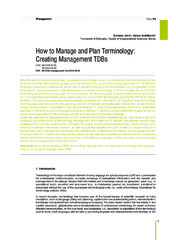Please use this identifier to cite or link to this item:
https://rfos.fon.bg.ac.rs/handle/123456789/1477Full metadata record
| DC Field | Value | Language |
|---|---|---|
| dc.creator | Jakić, Gordana | |
| dc.creator | Anđelković, Jelena | |
| dc.date.accessioned | 2023-05-12T10:58:14Z | - |
| dc.date.available | 2023-05-12T10:58:14Z | - |
| dc.date.issued | 2016 | |
| dc.identifier.issn | 0354-8635 | |
| dc.identifier.uri | https://rfos.fon.bg.ac.rs/handle/123456789/1477 | - |
| dc.description.abstract | Scientific and technical terminology represents a very topical issue in economically and technologically dependent countries with small languages such as Serbian. The current terminological problems in the Serbian language, especially in specialized areas that are experiencing dynamic development, are: Anglicization of the language for special purposes, underdeveloped and unstable terminology, and lack of adequate and modern terminological and lexical resources. On the one hand, the terminological problems listed above are of concern to subject-field specialists, since inadequate and non-existent terminology significantly affects the representation, transfer and management of specialized knowledge and information. On the other hand, terminology and language planners point to the growing need for immediate and systematic intervention aimed at terminology harmonization, consolidation and standardization. In spite of the awareness, there is no systematic approach to the solving of terminological problems in Serbian. In addition, practical activities regarding the collection and organization of terminology are few and reduced to individual initiatives. Under the paradigm of language planning (LP)-oriented terminology management (2), this paper is going to address a practical activity of terminology management: the creation of a Serbian management terminology database (TDB) with equivalent terms in English. The paper will discuss the methodology of terminology work, potential obstacles in termbase creation, as well as potential benefits that such a resource would have on all its potential users: management specialists and practitioners, professional translators, and language and terminology planners. A particular focus will be placed on the potential significance that this kind of a database would have for terminology policy and planning in the Serbian language, on the one hand, and knowledge transfer and management, on the other hand. | en |
| dc.publisher | Univerzitet u Beogradu - Fakultet organizacionih nauka, Beograd | |
| dc.rights | openAccess | |
| dc.rights.uri | https://creativecommons.org/licenses/by-nc-nd/4.0/ | |
| dc.source | Management - časopis za teoriju i praksu menadžmenta | |
| dc.subject | terminology management | en |
| dc.subject | terminology knowledge base (TKB) | en |
| dc.subject | terminology database (TDB) | en |
| dc.subject | management terminology | en |
| dc.subject | language planning | en |
| dc.title | How to manage and plan terminology: Creating management TDBs | en |
| dc.type | article | |
| dc.rights.license | BY-NC-ND | |
| dc.citation.epage | 12 | |
| dc.citation.issue | 79 | |
| dc.citation.other | 21(79): 1-12 | |
| dc.citation.spage | 1 | |
| dc.citation.volume | 21 | |
| dc.identifier.doi | 10.7595/management.fon.2016.0013 | |
| dc.identifier.fulltext | http://prototype2.rcub.bg.ac.rs/bitstream/id/267/1473.pdf | |
| dc.identifier.rcub | conv_812 | |
| dc.type.version | publishedVersion | |
| item.cerifentitytype | Publications | - |
| item.fulltext | With Fulltext | - |
| item.grantfulltext | open | - |
| item.openairecristype | http://purl.org/coar/resource_type/c_18cf | - |
| item.openairetype | article | - |
| Appears in Collections: | Radovi istraživača / Researchers’ publications | |
Page view(s)
8
checked on Dec 28, 2025
Download(s)
2
checked on Dec 28, 2025
Google ScholarTM
Check
Altmetric
This item is licensed under a Creative Commons License


